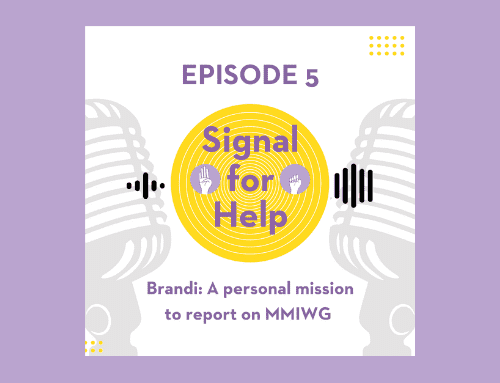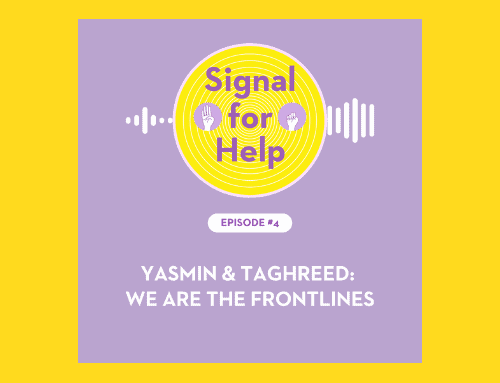
For Hillary Aitken, a graduate of the Canadian Women’s Foundation Leadership Institute at the Coady International Institute, co-managing the Victoria Faulkner Women’s Centre (VFWC) in Whitehorse while raising a bubbly and bright two year old are keeping her very busy, but she is ready for her next foray into a post-secondary program. Aitken says her experience working through the Leadership Institute helped position her for a masters degree in community development. She has applied to the program in Victoria, B.C. and we have no doubt she will approach this next endeavor with the same commitment and skill as she did in her time with the Coady Institute.
I had the pleasure of visiting Hillary at the VFWC where she holds the role of program coordinator. Uniquely, the VFWC has always maintained a flat management structure, where leadership is shared among key actors in the organization and decision-making is done as much as possible by the team. Once they have clearly identified what they need to do to move forward they then collectively identify tangible solutions.
While with the Leadership Institute, Aitken conducted research on similar models of organizational management and with a grant from the Canadian Women’s Foundation and matched funding from her own organization, they hired a consultant to help them identify a plan for moving forward. “The nice surprise for me is that everyone wants to keep the collective management model,” says Aitken. “Everyone is committed to making it better.”
She brings me up to date by letting me know they are still working on this and are coming up to a two-day retreat so they may work on the organization’s strategic goals. “This weekend’s focus is on decision making; when do we make decisions on our own, when do we bring it to the team and when do we wait for the whole collective to meet, as well as updating our visual model for collective management. They like to joke about the image of a Jello mold. Things that limit or create hierarchies is information, so if you share even the most simple things, it changes the power dynamics.”
In addition to sharing power and information, the team at VFWC is concerned about succession planning. “So much gets lost in the transfer of leadership, if it not captured somewhere it gets lost for good,” says Aitken. In response to questions about whether they plan to expand she replies with a smile, “We are seeing that it makes more sense to do what we are doing well before we stretch ourselves too thin. It is always exciting to think about new opportunities for growth.” She and others feel they need to strengthen the organization where it is now before they expand.
VFWC is turning 40 next year and they hired a summer student to help capture how the centre has evolved over time. She conducted interviews with people who had been connected to the Centre from the beginning. Initially, it was most important to have space of their own. When the organization started they only had one coordinator, and a hotplate for soup and coffee, and had to beg for paper and toilet paper donations. Now they can boast that they have secured stable funding, providing essential services for women in a two-story converted high-ranch home.
Just some of the key supports they provide include a drop-in centre from 11am-3pm Monday to Friday, a shower, laundry facilities, women can have a coffee and talk with other women, meet with a women’s advocate who provides counseling, advocacy and systems navigation, a Healthy Moms/Healthy Babies pre and post-natal program, visiting guest speakers, a Wednesday community kitchen, a girls’ club (helping them with media literacy and deconstructing things through a feminist lens), movie-making, art work and flash mobs. Aitken describes them as, “a neat unit of budding feminists.” VFWC is supporting them to network with other girls’ organizations across the territory.
Aiken plays another important role in the organization developing prevention education. Rates of domestic violence against women in the Yukon are three times higher than anywhere in the country. She and her colleagues at trying to develop creative ways to catch people’s attention, and impact people’s behaviors positively. The content of the work focuses on sexualized and domestic violence, rape culture and harassment.
They have also started the ‘consent crew’ in the summer, which is a group of 20 volunteers that distribute stickers that have a message about consent at music festivals and First Nations hand games. This year they had a tic-tac-toe game asking questions related to the nature of sexual assault. According to Aitken, it has been challenging to track the impact of this campaign, but they are getting positive feedback. Another successful campaign that was getting broad national attention was their “Call It What it Is” campaign.
When reflecting on her experience at Coady, Aitken says, "My experience with the staff and facilitators at the Coady Institute was amazing. They are incredibly smart, hardworking women, with an eye to critical analysis but their feet grounded in reality. I also learned so much from my colleagues in my course. It is wonderful to have a supportive network of 25 women doing ground-breaking work across the country.”
If you'd like to learn more about the Leadership Institute, please visit the Coady International Institute's website or contact Pamela at pjohnson@stfx.ca.
Learn More
- Leaning In and Reaching Out: Paving the Way for the Next Generation of Women Leaders
- Learning from Canada’s Aboriginal Women Leaders
- It Starts With Us
- Join GEN1. Become a monthly donor and help us build the first generation of inclusive leadership.
- Sign up for our e-newsletter to have our latest stories and resources sent to your inbox.
- Follow us on Facebook and Twitter to join a national conversation on gender equality.







